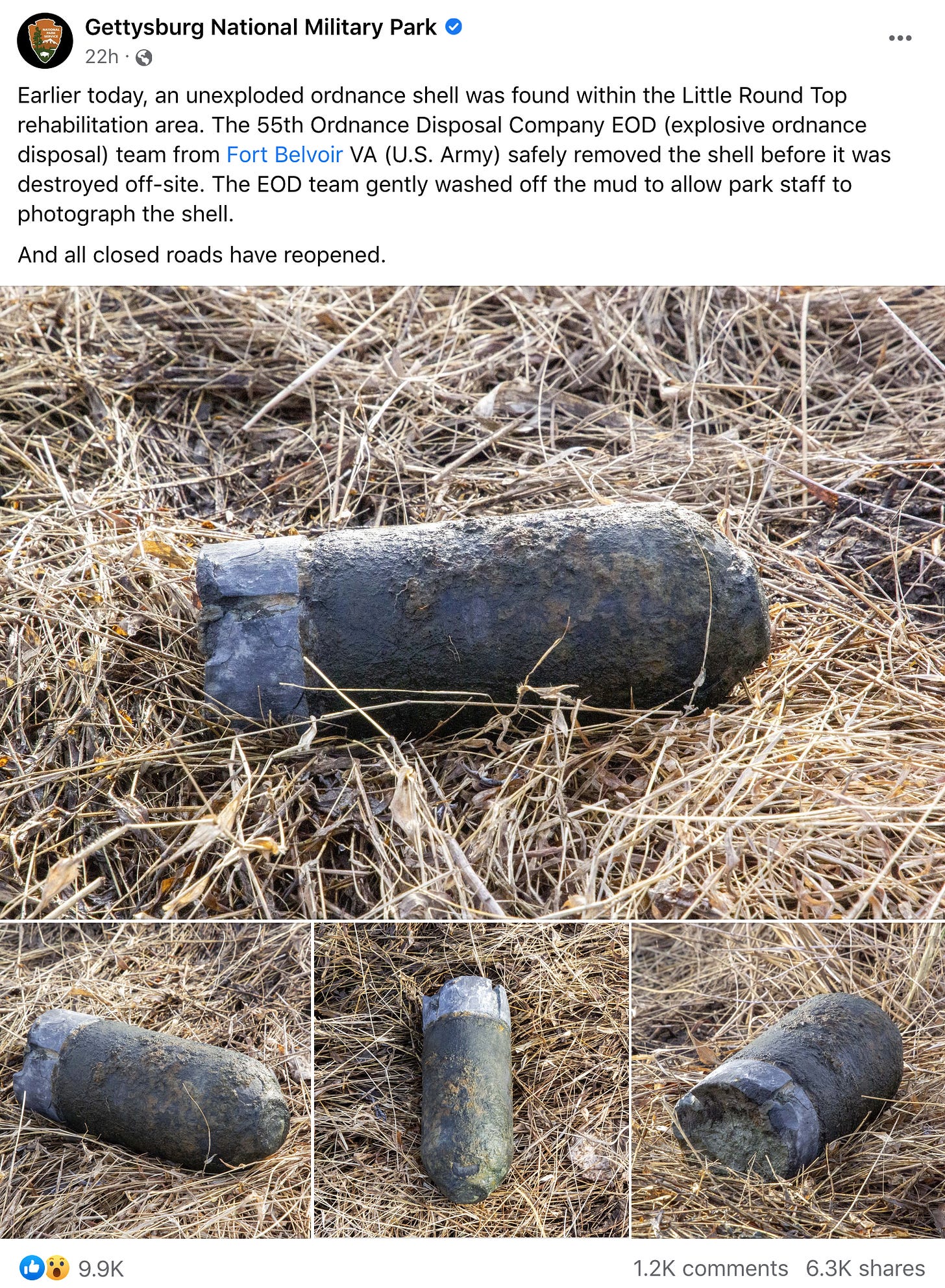In the News
An unexploded ordnance shell was discovered on the Gettysburg battlefield in the area around Little Round Top. This area has been closed off to the general public for a number of months as part of an extensive rehabilitation project. The public was never in danger.
The January 6 rioter who entered the Capitol Building carrying a Confederate flag has been sentenced to three years in prison.
Brianna Frakes explores the violent reception of the Emancipation Proclamation among white southerners after its release on January 1, 1863.
It is critical that we remember the varied responses to the Emancipation Proclamation, especially as American society continues to grapple with the lasting legacies of our past, including slavery. This is especially true as we look ahead not just to Black History Month, but also to the 160th anniversary of the Civil War’s end in 2025 and the 250th anniversary of the United States in 2026. Working toward a shared understanding of the context in which the Emancipation Proclamation was released, as well as its reception following Jan. 1, 1863, will only strengthen our ability as a society to commemorate and remember our past truthfully.
In light of the ongoing debate about the AP African American Studies course, historian Adam Laats offers a reminder that conservative attempts to censor the teaching of history will likely backfire.
Yet history tells us these efforts to use Black history to teach a heroic story of White America probably won’t succeed in the long run. For more than a century, conservatives have tried to use history classes to infuse students with, in the words of one 1920s activist, “a patriotic and unswerving loyalty to our United States.” They’ve done this by insisting on a curriculum that twists and distorts the United States’ racial history, turning centuries of struggle and oppression into patriotic tales of American heroism. They fear that a more accurate narrative might diminish students’ love of country.
The results have been poor. It has always been hard enough for students to learn basic facts about America’s past. By making it unacceptable to teach the truth of America’s racial history — even when the historical facts are unambiguous — conservatives have managed to ensure that students learn even less.
More than 200 students walked out of class this week at Hillcrest High School in Tuscaloosa, Alabama. The protest happened in response to students saying they were told by school leaders to omit certain events from a student-led Black History Month program scheduled for Feb. 22.
I love this feature at The Civil War Monitor magazine. George Rable is one of my favorite Civil War historians. Check out the books that influenced him early on in his career.
Videos
The American Civil War Museum in Richmond, Virginia recently hosted a presentation by Connor Williams, who served on the Naming Commission. The commission was tasked with reviewing military assets that honor Confederate leaders. This has led to the changing of names of military bases and will soon result in the removal of the Confederate monument in Arlington.
This video was taken by a member of a group that is working to protect the monument. It’s not the best quality, but the Q&A is well worth watching toward the end.
Here are two presentations from the Winter Lecture Series sponsored by the Gettysburg National Military Park. The first focuses on the 1913 reunion and the second explores soldier letters from the battle. Both are worth watching.
New to the Civil War Memory Library
J.L. Chestnut, Black in Selma: The Uncommon Life of J.L. Chestnut Jr. (The University of Alabama Press, 1990).
Alston Fitts III, Selma: A Bicentennial History (The University of Alabama Press, 2016).
Kari Frederickson, The Dixiecrat Revolt and the end of the Solid South: 1932-1968 (University of North Carolina Press, 2001).
Candice Shy Hooper, Delivered Under Fire: Absalom Markland and Freedom’s Mail (Potoma Books, 2023).
Bernard LaFayette Jr. and Kathryn Lee Johnson, In Peace and Freedom: My Journey in Selma (University Press of Kentucky, 2013).
J. Mill Thornton III, Dividing Lines: Municipal Politics and the Struggle for Civil Rights in Montgomery, Birmingham, and Selma (The Univeristy of Alabama Press, 2006).
Otis
The big guy is spending the afternoon getting pampered at the groomer. What a life.






Wow, that discussion in Richmond (my hometown) was pretty interesting!